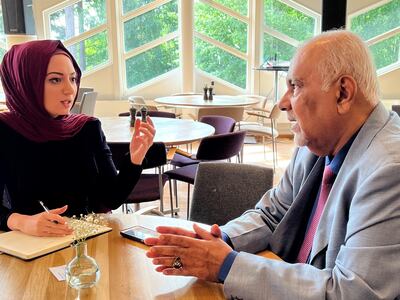Yemen’s armed groups should be integrated into a national army in order to rebuild the country’s security apparatus, the adviser to the head of the country's presidential council told The National.
”A state cannot be created while militia roam free. Militias do not build nations,” Yaseen Makkawi said in an exclusive interview on the sidelines of the first Yemen International Forum in Stockholm.

The three-day event organised by the Sanaa Centre for Strategic Studies and the Swedish government is being attended by Yemeni politicians, legal experts and prominent members of civil society as well as the UN and US special envoys and a number of representatives from the international community and finance officials linked to the Houthi rebels.
The meeting is being held amid the longest nationwide truce since civil war broke out in late 2014 when the Iran-backed rebels overran the capital, Sanaa, forcing the government to flee south and later into exile in Saudi Arabia.
Nearly eight years later, the rebels control most of the north, while the government, backed by the army and an array of militias, holds the south.
The conflict has forced millions of Yemenis to leave their homes and left 70 per cent of the population reliant on aid to survive in what the UN has called the world's biggest humanitarian crisis.
Mr Makkawi said the eight-member presidential council, which replaced former president Abdrabu Mansur Hadi in April following intra-Yemeni talks hosted by Saudi Arabia, is up against “complex challenges”. These include creating a military front that prioritises national interests “in the north and in the south”, he said.
“The security situation in Yemen should be rooted in its national identity through power-sharing,” said Mr Makkawi, who was also adviser to Mr Hadi
“We need a true and genuine national army that has loyalty to all the country’s governorates — without militias — within a decentralised, Federal system,“ he said.
The Houthis‘ presence in Sanaa as an armed group and their position of power present “a real dilemma“, Mr Makkawi said.
He conceded that the group could play a political role, “so long as they do not possess weapons”, adding that he feared the emergence of a government like Lebanon's in which the Iran-backed Hezbollah movement, the country's only armed group outside the military, holds considerable sway over politics.
”What is preventing Lebanon from returning to its former glory? It’s the weaponisation of decision-making, and having a veto power through arms,” he said.
In closed sessions at the forum on Saturday, experts discussed ways to integrate fighters into a national security apparatus or civilian life. The presence of child soldiers and the number of armed state and non-state actors, thought to be in the millions, are major challenges to establishing such a programme, they said.
Mr Makkawi believes finding common ground is imperative in this juncture, as the country enters the third month of the UN-brokered truce that has largely held despite reports of violations by the warring sides.
”It is time to talk about the commonalities among Yemenis, and that is the fact that the country is being destroyed and is in the last stages of destruction. It is time to rebuild it by reshuffling our cards on the road to rebuilding institutions," he said.
“Civilians are being starved and killed. The presidential council needs to look to the future - and give Yemenis hope for their own future.”



